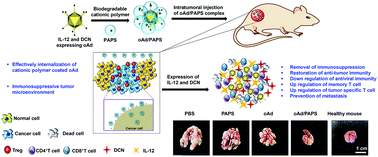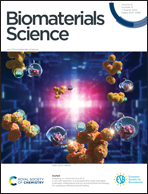Bioreducible polymer-mediated delivery of oncolytic adenovirus can attenuate antiviral immune response and concurrently enhance the induction of antitumor immune response to effectively prevent metastasis†
Abstract
Oncolytic virotherapy is a highly promising and novel treatment modality for cancer. Several clinical trials with oncolytic viruses have illustrated that the potent antitumor efficacy of these viruses may rely on the efficient induction of antitumor immune response. In contrast, antiviral immune response is attributed to adverse side defects and diminishing therapeutic efficacy. In the present report, we generated a nanohybrid complex incorporating immune stimulatory oncolytic adenovirus (oAd) co-expressing decorin (DCN) and interleukin (IL)-12 with a bioreducible nanomaterial composed of PEI-Arg-mPEG-S-S-mPEG-Arg-PEI blocks (PAPS), ultimately aiming to modulate both antitumor and antiviral immune responses to be favorable toward oncolytic virotherapy. The transduction efficacy of the PAPS-incorporated nanohybrid vector (Ad/PAPS) was significantly higher than that of a complex using our previously reported polymer PPSA (Ad/PPSA) regardless of the cellular coxsackievirus and adenovirus receptor expression level of cancer cells. oAd complexed with PAPS (oAd/PAPS) also elicited a more potent cancer cell killing effect, antitumor efficacy, and metastasis inhibition than naked oAd or oAd complexed with PPSA (oAd/PPSA) through a higher level of therapeutic transgenes (DCN and IL-12), viral replication, and more efficient infiltration of T cells into tumor tissues. Notably, oAd/PAPS induced the highest level of antitumor immune response while the antiviral immune response was mediated at a significantly lower level than those of naked oAd. Adaptive immune response against the virus was also significantly attenuated in the oAd/PAPS group. oAd/PAPS treatment also led to the highest level of antitumor central memory T cells and the lowest level of immunosuppressive regulatory T cells in the spleen. Collectively, our findings illustrate that oAd/PAPS can simultaneously regulate both antitumor and antiviral immune responses to be more favorable to oncolytic virotherapy, leading to improved gene expression, viral replication, and growth inhibition of both primary and metastatic tumors.



 Please wait while we load your content...
Please wait while we load your content...